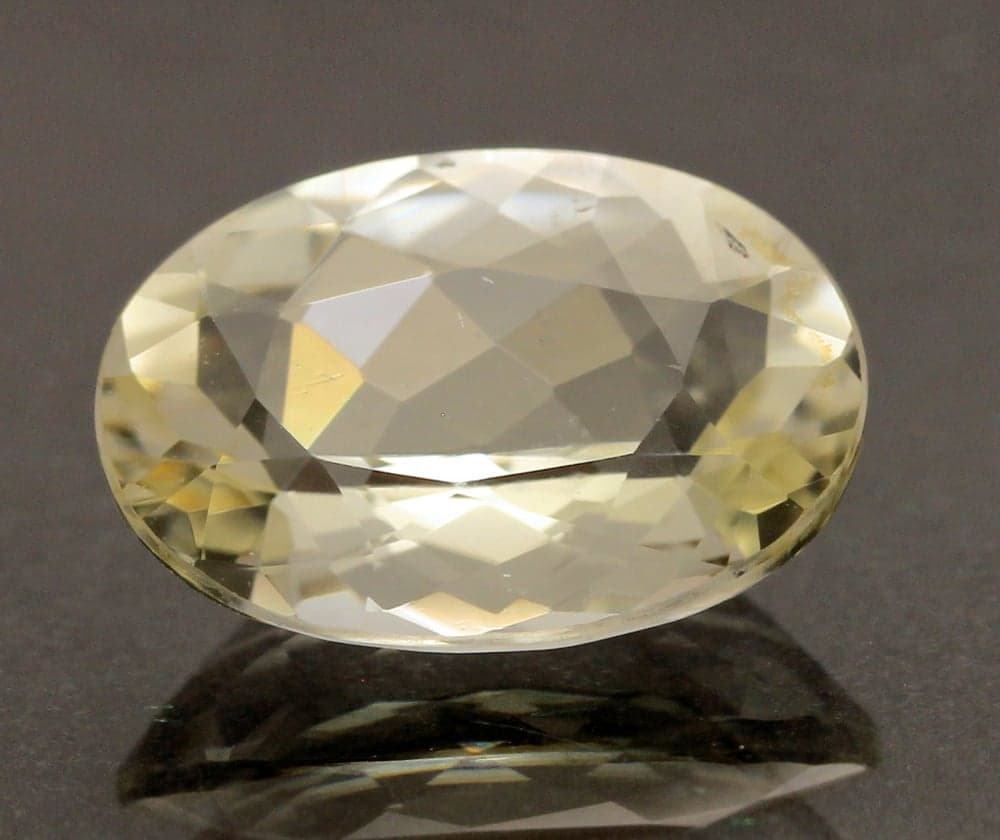Euclase Value, Price, and Jewelry Information
Although hard enough to be worn safely in jewelry, euclase in beautiful colors is rare over a few carats. It’s also a difficult gem to facet.
2 Minute Read
Although hard enough to be worn safely in jewelry, euclase in beautiful colors is rare over a few carats. It’s also a difficult gem to facet.
Start an IGS Membership today
for full access to our price guide (updated monthly).Euclase Value
Comments
Colorless euclase may not look terribly exciting, but faceted pieces can have exceptional brilliance. Strongly colored euclases in blue or green are prized by collectors of rare gems. Violet is the rarest and most desired color.
With hardness ranging from 6.5 to 7.5, euclases would make good jewelry stones, but they present some challenges for faceters. Their perfect cleavage in one direction makes cutting a bit tricky. Jewelers would also need to set this stone with care, especially in a ring, to avoid placing stress on its cleavage plane.
Identifying Characteristics
Euclases may have variable hardness even within the same crystal.
Most euclases receive what color they have from traces of iron. However, some euclases from Colombia receive their greenish blue color from traces of chromium. These stones appear red under a Chelsea filter.
Synthetics
No known synthetics.
Be aware that some aquamarines have been misrepresented as much rarer light blue or green euclases to sell for more money. Although euclase can form geologically from the decomposition of beryl and is often found with beryl, they're distinct mineral species. They have different optical and physical properties.
Enhancements
Radiation treatments can turn colorless euclases green or blue.
Sources
Brazil produces most cuttable, gem-quality euclases. In Minas Gerais, Ouro Preto yields fine gem material in good crystals up to a length of about 6 cm. Santana de Encoberto yields material with high birefringence and included crystals of apatite, hematite, rutile, and zircon. BoaVista also yields cuttable crystals.
Miami, Zimbabwe produces cuttable crystals in shades of intense, cobaltian blue hue, some look like fine sapphires.
Other notable gem-quality sources include the following:
- Orenburg District, South Urals, Russia: cuttable crystals.
- Austria; Colombia; Ireland; Myanmar; Norway; Morogoro District, Tanzania; Colorado, United States.
Stone Sizes
Crystals most commonly occur in small sizes, about 1" for colorless material. Most euclases are, in fact, colorless. Strongly colored material is very rare. Blue and green gems are scarce over 2-3 carats. Some Brazilian violet crystals reportedly could yield stones up to 10 carats.
Colorless gems over 5-6 carats are also rare, although stones up to about 20 carats have been cut. Gems reported over 50 carats are museum pieces.
- Smithsonian Institution (Washington, DC): 144 (lime green, Brazil); 48.7 (green): 12.5 green, Brazil; 8.9 (yellow, Brazil); 3.7 (blue-green, Brazil).
- Devonian Group (Calgary, Alberta, Canada): 15.45 (colorless, Brazil): 14.0 (mint green, Brazil).
- Private Collection: 18.29 (blue-green oval, Brazil); 7.43 (blue, Brazil).
Care
Due to their perfect cleavage, don't clean euclases with mechanical systems. Use only warm water, mild detergent, and a soft brush. Use protective settings for rings and make sure you discuss with your jeweler how best to set any euclases.
For more cleaning recommendations, consult our gemstone jewelry care guide.
Joel E. Arem, Ph.D., FGA
Dr. Joel E. Arem has more than 60 years of experience in the world of gems and minerals. After obtaining his Ph.D. in Mineralogy from Harvard University, he has published numerous books that are still among the most widely used references and guidebooks on crystals, gems and minerals in the world.
Co-founder and President of numerous organizations, Dr. Arem has enjoyed a lifelong career in mineralogy and gemology. He has been a Smithsonian scientist and Curator, a consultant to many well-known companies and institutions, and a prolific author and speaker. Although his main activities have been as a gem cutter and dealer, his focus has always been education.
International Gem Society
Related Articles
Amblygonite Value, Price, and Jewelry Information
Vivianite Value, Price, and Jewelry Information
Sarcolite Value, Price, and Jewelry Information
Spurrite Value, Price, and Jewelry Information
Never Stop Learning
When you join the IGS community, you get trusted diamond & gemstone information when you need it.
Get Gemology Insights
Get started with the International Gem Society’s free guide to gemstone identification. Join our weekly newsletter & get a free copy of the Gem ID Checklist!
